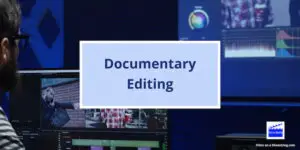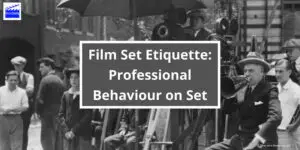A film synopsis, created by screenwriters and filmmakers before the full script is created, is longer than the one-sentence logline and shorter than the scene-by-scene breakdown of the film treatment which is used for pitching.
What is a Film Synopsis?
A film synopsis is a short summary of the script, outlining the plot and world of the story in a maximum of three pages, setting out the core concept, major plot points, and main character arcs.
A screenwriter sends their synopsis, along with a query letter, to agents, managers, producers, and studio executives. They decide from the synopsis whether the screenplay is worth reading.
Potential financiers, filmmakers and other industry professionals can also use the film synopsis as part of the information to decide if the project has commercial potential and is right for them, perhaps reviewing it before agreeing to a pitch.
The Difference Between a Synopsis and a Logline
A logline is a one-sentence summary of a screenplay, film, or television program that captures the essence of the story in about 25 to 30 words.
A synopsis is typically a one, two, or three page document that summarises your film and includes the film’s title, genre, logline, plot points, turning points, climax and denouement.
A good logline contains a sense of who the main character is and what their ‘problem’ is while summarising your story in as few words as possible. A good synopsis should contain detailed information about the characters and their arcs as well as plot points and any other elements that are integral to your story.
Why is a Synopsis Important?
A movie synopsis is an important part of the filmmaking process, allowing potential agents, managers, producers, directors, and financiers to gain a quick understanding of the story and its potential.
It should be concise yet engaging and capture the essence of the story in a few sentences.
Above all, it should keep the reader wanting to know more about the project so they are excited to read the full script.
It’s a great way to pitch a script and get people on board with the project, alongside a more detailed film treatment if someone is interested in finding out more about the script or project.
A synopsis can also help filmmakers keep track of their story structure and ensure that their screenplay follows a clear narrative arc.
How to Write a Film Synopsis
Writing a film synopsis can be a daunting task, but it doesn’t have to be. By understanding the difference between a synopsis and a logline, knowing why a synopsis is important, and following some simple tips for writing a good film synopsis, any filmmaker can craft an effective synopsis for their project.
You can follow a film synopsis template to make sure you include all aspects needed, but make sure that as you condense your project into the brief summary it still retains an engaging story that piques interest.
When writing your synopsis, it’s important to remember that it should include all of the elements of your story, including the main character’s goals and motivations, the conflict they face and obstacles they must overcome, and key plot points. It should also provide an overview of the story arc and any climactic moments. Additionally, remember to keep your synopsis to two or three pages in length and make sure that it tells a compelling story.
Finally, make sure to avoid common mistakes such as too much detail or exposition, overly long sentences or paragraphs, or summarising each scene instead of the plot as a whole. Instead focus on providing an overview of your story that will captivate readers and entice them to read your script.
With this approach and these tips in mind, you’ll be able to write an effective film synopsis that will help you get noticed by producers and agents alike.
What is a Good Film Synopsis
A good film synopsis is concise and informative, giving readers a clear understanding of the key elements of the plot, protagonist’s story goals, the source of conflict, and the stakes at risk. It should be kept to a few sentences and should include essential plot points, character arcs, and any major plot twists.
A good synopsis should also be written in a way that engages readers and encourages them to want to know more about the story.
A good film synopsis includes:
- Title
- Contact information
- Logline
- One paragraph per act, written in the 3rd person in the present tense
- Focus on the main story, overlooking subplots and other lengthy details
- Clear character arc
- A satisfying ending
Tips for Writing a Good Film Synopsis
Writing a good film synopsis requires more than just summarising the plot of your screenplay. It also requires the writer to focus on the story’s main points and characters in a way that will engage readers. After all, you must see the synopsis as a selling tool.
A few tips that can help writers create a compelling synopsis include:
Start with the protagonist. Right off the bat, your movie synopsis should clearly explain what the main character wants and what they’re trying to achieve throughout the story.
Stick to only the important plot points when writing a movie synopsis. A screenplay needs to be brisk and always moving the plot forward, so it’s important to include only the events that are absolutely necessary for understanding the story.
Think about the beat in your script, and reflect this in your summary.
Keep it short and sweet. A one-page film synopsis is sometimes too short for the level of detail required, but two or three pages are more than enough for summarising your screenplay. Don’t get too wordy or stray too far from the main points of your story.
Finally, make sure to include any interesting aspects about your script that make it stand out from the crowd.
Common Mistakes to Avoid When Writing Your Synopsis
Writing a film synopsis can be daunting, but it’s an important part of selling your script. An effective synopsis should capture the reader’s attention and give the reader an idea of what’s to come.
To do this, it’s important to avoid common mistakes, like not showing a clear plot arc and failing to provide a clear story structure.
How Long Should Your Synopsis Be?
When it comes to writing a film synopsis, one of the most common questions is how long should it be? But there’s a difference of opinion on the topic.
For an agent inundated with submissions from unknown screenwriters, a welcome synopsis is a one-page brief document they can quickly check before moving on to the next one. But for some projects a synopsis one page long isn’t enough to cover the basic story and convey the character arc, so a second or third page are needed.
On average, a movie synopsis is one to three pages long. Many screenwriters limit their synopses to 500 words.
The movie synopsis should be as clear and concise as possible, yet also engaging. Don’t create more than three pages, and only create more than one page if it’s essential.
Ultimately, the length of your synopsis depends on the purpose and goal of the document, but no matter what length you choose, make sure it is well written and engaging so that readers will be eager to read your script!
Storytelling Through Your Synopsis
When writing a film synopsis, it is important to consider how the story will unfold, both in terms of plot and character arcs. Your synopsis should provide an engaging story, ofte following the traditional three-act structure.
Include a brief setup of the main plot, introduce the main characters and their motivations, and provide a glimpse into each act’s events. You can then use the synopsis to develop plot twists and reveal key character moments that will drive the story. As you write the synopsis, think about how each scene will move the plot forward and how it will affect your characters.
Through effective storytelling, your synopsis should be able to give potential readers an idea of what makes your script unique and why it deserves to be greenlit.
Using Your Synopsis to Sell Your Script
Writing a good screenplay synopsis is essential for convincing financiers and influencers your project is worth their time, money and interest.
Your synopsis should be short and concise, giving a clear overview of the story and characters, including the conflict and stakes. It should also be written in a way that captures the reader’s attention and entices them to read further.
You can use your synopsis to emphasise the themes of your story and provide insight into how the narrative will play out.
By using your synopsis as a powerful selling tool, you can increase the chances of your screenplay being read and brought to life.
You may also like
- Low Budget Filmmaking: More for Less
- Lighting Department Film Roles
- Shooting An Interview
- Documentary Editing
- What is Sound Design in Film?
- Color Grading for Documentary Series or Film
- Film Set Etiquette: Professional Behaviour on Set
- Observational Documentaries And Their Impact
- Essential Skills for Film Industry Professionals
- How to Create a Storyboard in 6 Simple Steps












